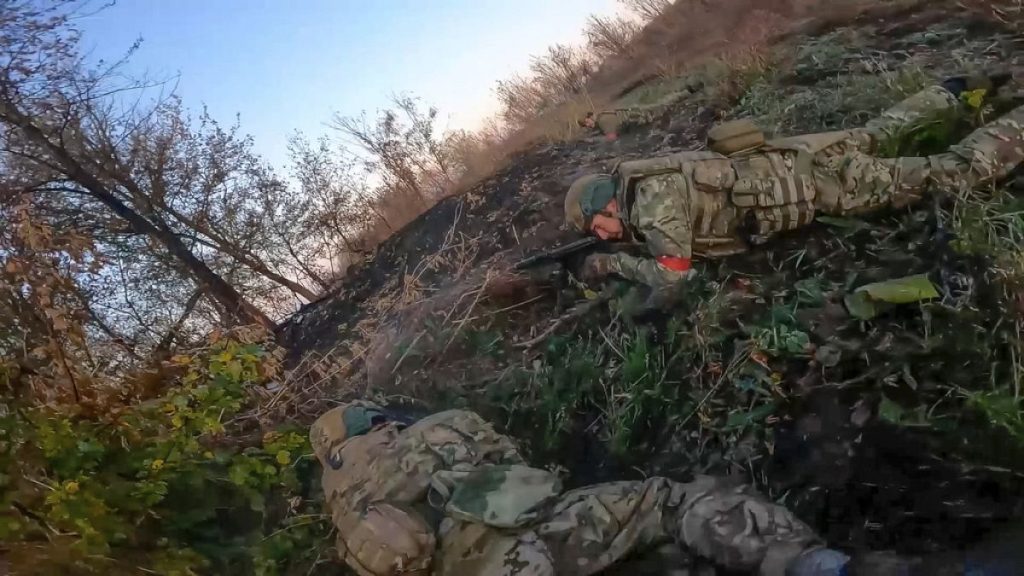Ukrainian President Volodymyr Zelenskyy announced during his nightly address on Saturday that Russian and North Korean forces had lost up to a battalion of infantry in battles near the village of Makhnovka in the Kursk region. Zelenskyy stated that the soldiers killed included Russian paratroopers and soldiers from Pyongyang, with a battalion typically consisting of up to 1,000 soldiers. The ongoing conflict in the region began when Kyiv’s forces launched an invasion in early August, capturing over 1,000 square kilometres of Russian territory. However, Russia responded with a counter-assault, rallying its forces and amassing more than 50,000 troops in the region, including some from North Korea. The intense fighting has resulted in significant casualties on both sides, with the Ukrainians losing over 40% of the Kursk territory they had seized in August.
As a result of Russia’s counterattack, Ukraine currently controls only about one-fifth of its territory, with Russia capitalizing on weaknesses in Ukraine’s defences to slowly advance in eastern areas. Zelenskyy has announced plans to hold meetings with international allies this week at the US airbase in Ramstein, Germany to discuss strengthening Ukraine’s air defences. The talks will involve dozens of partner countries capable of bolstering Ukraine’s defence against missiles, guided bombs, and Russian aircraft. The conflict in the Kursk region is ongoing, with both sides continuing to engage in intense battles that have resulted in significant casualties.
The conflict in the Kursk region has been marked by intense fighting, with both sides suffering heavy losses. Zelenskyy’s announcement regarding the killing of Russian paratroopers and North Korean soldiers near the village of Makhnovka highlights the ongoing violence in the region. The initial success of Ukraine’s invasion in August was met with a swift and determined counter-assault by Russia, resulting in the loss of significant territory by the Ukrainian forces. Russia’s deployment of troops, including those from its ally North Korea, has further escalated the conflict, leading to high casualties on both sides.
Zelenskyy’s efforts to strengthen Ukraine’s air defences through meetings with international allies reflect the gravity of the situation in the Kursk region. With Russia maintaining control over a substantial portion of Ukraine’s territory and continuing to advance in eastern areas, the need for enhanced defence capabilities is paramount. The upcoming talks at the US airbase in Ramstein, Germany will bring together partner countries capable of providing support to Ukraine in countering Russian aggression and defending against aerial threats. The discussions will focus on strategies to bolster Ukraine’s defences against missiles, guided bombs, and Russian aircraft.
The conflict in the Kursk region represents a key battleground in the broader struggle between Ukraine and Russia, with significant implications for regional stability. The deployment of troops from North Korea alongside Russian forces underscores the complex nature of the conflict and the willingness of both sides to escalate tensions. Despite the challenges faced by Ukraine in the face of Russian aggression, Zelenskyy remains determined to seek support from international allies and enhance the country’s defence capabilities. The ongoing fighting in the region highlights the urgent need for diplomatic solutions and international cooperation to address the crisis and prevent further escalation of the conflict.
Overall, the situation in the Kursk region remains fluid and volatile, with both sides continuing to engage in intense battles that have resulted in heavy casualties. Zelenskyy’s efforts to strengthen Ukraine’s air defences and seek support from international allies reflect the seriousness of the conflict and the need for external assistance. The upcoming meetings at the US airbase in Ramstein, Germany will provide an opportunity for Ukraine to strategize with partner countries on ways to enhance its defences against Russian aggression and protect against aerial threats. As the conflict in the Kursk region continues to unfold, the international community will play a crucial role in shaping the outcome and preventing further escalation of violence.













